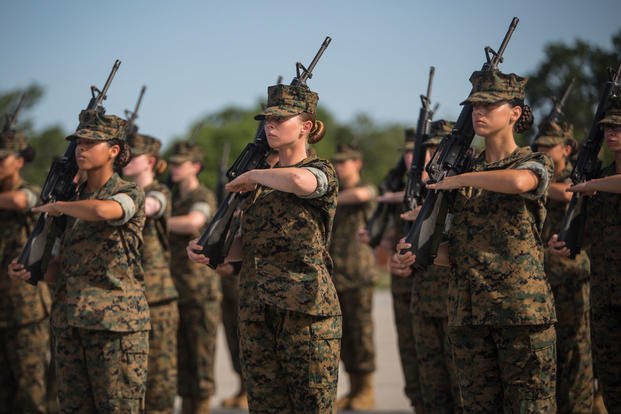McKenna Fellows, Staff Writer
History has dictated that women be excluded from military drafts as a result of job limitations within the service. However, considering the great steps the United States has taken over the past decades, a new question has been raised regarding a woman’s right to serve, and it doesn’t seem to be disappearing any time soon.
With all of the recent talk about a potential World War III, this modern debate of Selective Service that would have been considered unconscionable a few decades ago is now invading the media. For quite some time, many have assumed the roles of critics, claiming that increased gender diversity within the military will decrease its productivity. This belief has perpetuated the oppression of women in the United States military, and continues to support the idea that incorporating women into service, while progressive, may affect its efficiency and functionality. Junior Charlotte O’Toole shares, “Everyone should have the opportunity to volunteer and contribute to our country’s military force, however, for selfish reasons, I would prefer that women not be drafted, as I myself do not want to be drafted.” She is not alone in her sentiments, as sophomore Lucy Mitchell admits, “While I am completely in favor of an equal draft, there is a small side of me that is glad I don’t have to worry about being drafted. Don’t get me wrong though, the stereotype is wrong and should certainly be changed.” In any case, both of these circumstances demonstrate that the claim that drafting women would not shift military priorities from efficacy to creating social change. Drafting women cannot transform the military into a social analysis, on the grounds that the military has always reflected social shifts in the United States. For the military to truly serve and represent the United States, whoever serves must reflect national social sentiments that go a long way past military need.
On the other end of the draft debate spectrum are a plethora of passionate advocates for a woman’s right to serve. Ever since U.S. District Judge Gray Miller deemed an all-male registration unconstitutional, a significant percentage of the population has become impatient with the lack of action being taken in coherence with the ruling. Sophomore Sam Gibson notes, “I think everyone should be eligible to serve, regardless of gender, and that comes with equal drafts for men and women.” Opinions like these are not sparse among the Latin community, and senior Tej Bahri is yet another supportive source. He adds, “I definitely think women deserve to have the same representation as men in the draft. People often assume that being drafted means going straight into combat, but there are so many other roles that need occupying. Both men and women can fulfill any of them.” As the American public reexamines who should enlist with the Selective Service, it is important to recall that this issue has been debated in the past. The process of attaining equality in the military is slow-moving, though advocates for an equal draft feel strongly enough to fight until their desired results are achieved.
Regardless of stance, it is impossible to halt the progress of history. This fact is evident through the national effort to create balance among genders in the military. Ultimately, the country must decide whether discrimination in the armed forces on the basis of gender is constitutional. Once this is determined, proper action can be collectively taken to make appropriate adjustments to the military.
Categories:
Would Women be Drafted?
January 20, 2020
1
0

















































Robert Igbokwe • Jan 25, 2020 at 8:08 pm
Excellent article, McKenna!! You do a great job of examining the nuances of this debate. But hopefully, we won’t ever need to worry about a draft…